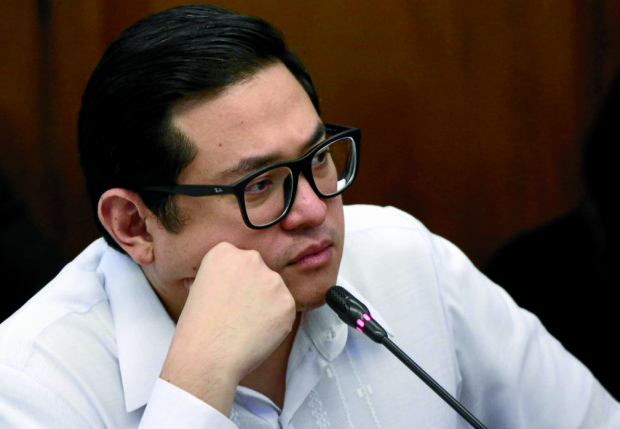
Sen. Paolo Benigno “Bam” Aquino IV. INQUIRER FILE PHOTO / RICHARD A. REYES
The “Zero Food Waste bill” is yet another casualty of fake news, Senator Bam Aquino said on Sunday as he lamented some dubious blogs which falsely branded the bill as meant to serve leftover food to the poor.
“Dahil sa pag-gamit ng fake news laban sa akin, pati ang mabuting reporma, siniraan na. Sayang ang Zero Food Waste bill na magpapatayo sana ng mga food banks sa bansa,” Aquino said of his Senate Bill No. 357, in a statement.
(Because of the use of fake news against me, even the good reforms are being discredited. What a pity because the Zero Food Waste bill would have built food banks in the country.)
According to the senator, several “dubious websites and blogs” criticized the bill saying it is meant to serve leftover food to the poor. Those websites, Aquino said, even carried a fake quote from him.
“I can overlook the name-calling, pero sayang naman ang panukalang ito na makakatulong sa mga Pilipinong nagugutom (but the bill that would help the starving Filipinos would be wasted). Nakain na ng fake news ang food bank bill (The food bank bill has been consumed by fake news),” Aquino lamented.
READ: Bam Aquino wants to create food banks for the poor
Despite this, the senator said he still hopes this reform could be resurrected and be heard in the Senate to “help address hunger in the country as well as reduce the wastage of food.”
If passed into law, Aquino said the measure would create a National Anti-Food Waste Scheme, with the Department of Social Welfare and Development (DSWD) as coordinating agency between food businesses, such as food manufacturers, supermarkets, restaurants, cafeterias, and hotels, and food banks.
The measure would mandate restaurants and supermarkets to give unserved food, such as canned goods and uncooked rice, to food-distribution charities or “food banks” to provide food to the poorest Filipino families, he said.
The scheme, he added, would set guidelines and standards for the collection, storage, and distribution of edible food donated to food banks.
“Cooked food or food waste would not be served but, instead, will be recycled into fertilizer or compost,” Aquino clarified. /je